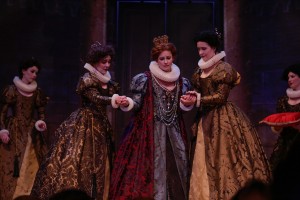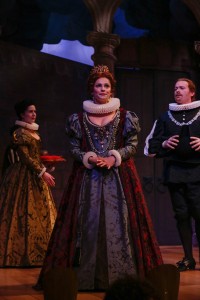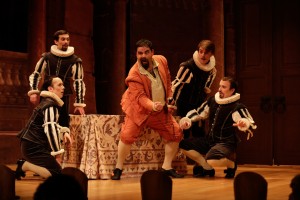Opera Review: Boston Early Music Festival’s Brilliant “Almira”
There is lots to praise (lavishly) in BEMF’s production of “Almira”: a large cast with no weak links, fabulous musicians, and inspired sets, costumes, and dancing.
By Susan Miron
The Boston Early Music Festival (BEMF) has had a huge hit this year—George Frideric Handel’s first opera, Almira, his Opus 1, written when he was 19. Planned, of course, years in advance, BEMF’s Almira gets everything right and has thrilled audiences at the Cutler Majestic Theater as well as critics, including this one. It has two upcoming performances at the Mahaiwe Performing Arts Center Theater in Great Barrington, MA (Friday, June 21 and Saturday, June 22, both at 7 p.m.). If you missed the opera’s Boston performances, it’s well worth taking a trip to the Berkshires.
Almira, Königin von Castilien provides an often comic look at how Germans in Handel’s time viewed Spaniards. It also reflects many of the characteristics of German opera that Handel would change when he later wrote for London audiences. The piece is astonishing as an Opus 1 — it contains more than 70 musical numbers. Handel, at that point a violinist in the Hamburg opera orchestra, got lucky—the composer originally slated to compose the opera got a better gig, and the young Handel (1685–1759) was chosen to write a new score to the old libretto of Friedrich Christian Feustking (1678–1739). The opera premiered in 1705 but was rarely performed, suffering from the erroneous assumption that it is a youthful (i.e., immature) work not worth serious consideration. Actually, Handel was far more of a a prodigy than he is usually considered—many of the arias in this opera were reused by the composer throughout his career, most notably “Lascia ch’io pianga” from Rinaldo.
There are myriad elements to praise lavishly in this production, starting with the dazzling Boston Early Music Festival Orchestra under the direction of festival co-directors Paul O’Dette and Steven Stubbs, here playing theorbo and baroque guitar. One of the two harpsichordists, Kristian Bezuidenhout, has assumed rock star glamour, appearing at the last minute when a colleague fell ill and impressing everyone within hearing distance. Teaming up with the other harpsichordist, Michael Sponseller, and superb Baroque harpist Maxine Eilander, he plucked a paradise of sound. Gonzalo X. Ruiz, oboist, bassoonist Marilyn Boenau, and recorder player Kathryn Montoya are also consistently excellent. And concertmaster Robert Mealy is, as always, outstanding.
Besides the fabulous musicians, what makes Boston Early Music Festival opera productions so extraordinary are their inspired sets, costumes, and dancing, all of which meet customary high standards in Almira. Much of the credit belongs to Gilbert Blin, the brilliant historian, stage director, and set designer, whose research for each of the five operas he’s done for BEMF has been a model of historical scholarship and imagination. The costumes designed by Anna Watkins are splendid, expertly informed by paintings, drawings, and prints of the period, with no salient detail overlooked. Choreographers Caroline Copland and Carlos Fittante should be credited with delightful examples of baroque dancing and movement.
Surprisingly, in this large cast there were no weak links. The lead for Almira had visa problems and was replaced by the beautiful-voiced Ulrike Hofbauer as the Queen of Castile.
As Edilia, who is ultimately paired with the disguised King of Mauretania, Raymondo (Tyler Duncan), Amanda Forsythe—a Boston favorite—nearly stole the show every time she sang her sparkling coloratura arias. She dazzles.
Zachary Wilder was impressive as Osman, the son of Consalvo, Prince of Segovia, guardian of Almira, who was sung by the excellent Christian Immler. My favorite singer was Valerie Vinzant who played Bellante, Princess of Aranda. I am anxious to hear her again.
But the greatest acting delight was another local favorite, Jason McStoots, who, clad in orange knickers and jacket, was cavorting up a storm as the mischievous buffoon Tabarco, servant of Fernando (Colin Balzer). Surely, given the festival’s theme, “Genius and Folly,” Tabarco was folly personified, generating much of the fun in this production; McStoots plays the gracious jester to the hilt. It’s a wonderful, manic acting job, and he even got to show off his alluring tenor voice. The audience adored him.
Bravo to all involved on stage and behind the scenes, particularly Kathleen Fay, BEMF’s executive director, and the indefatigable, incomparable Steven Stubbs and Paul O’Dette, who helped to assemble an unforgettable series of first-class afternoon, evening, and late night concerts, along with this jewel of an opera.
Susan Miron, a harpist, has been a book reviewer for over 20 years for a large variety of literary publications and newspapers. Her fields of expertise were East and Central European, Irish, and Israeli literature. Susan covers classical music for The Arts Fuse and The Boston Musical Intelligencer.



